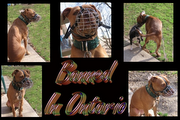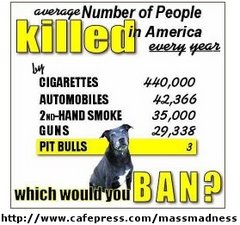Pit bull ban could be just a start for a safer city
John Barber waits to receive heaps of emotional and angry email for responces from his yesterday's Globe and Mail article.
Pit bull ban could be just a start for a safer city
JOHN BARBER
Good news! The number of pit bulls destroyed by the city every year has increased substantially since the breed was banned province wide in August, 2005.
Five hundred of the dogs have died painlessly in municipal facilities since the ban, compared with 441 that suffered the same fate in the 16 months prior to its enactment.
Of special interest, almost 200 of the potentially vicious animals were executed summarily: not because of anything they had done, but simply because of what they were.
The law is biting back.
This is not necessarily good news to the municipal officials charged with its enforcement.
Toronto animal services manager Eletta Purdy is one of a legion of experts, genuine and otherwise, who oppose the ban.
She would prefer to assess each potentially dangerous dog "on its own merit" before deciding whether to put it down.
"If it was a healthy, well-behaved dog, we would be placing it up for adoption, regardless of the breed," she said.
But now, municipal officials all over Ontario are forced to destroy many healthy, well-behaved and potentially adoptable dogs, simply because of their breed.
Because of that, and for many other reasons, just about every animal-welfare organization in existence, from the Ontario Veterinary Medical Association to the American Society for the Prevention of Cruelty to Animals, opposes breed-specific bans.
Their ultimate argument is that such bans do nothing to reduce the risk to small children of being torn to pieces by vicious dogs that, they acknowledge, were bred to kill.
But what if they're wrong?
What if even one of those 200 summary executions prevented a single hideous mauling of the sort that inspired Attorney-General Michael Bryant to ban pit bulls in Ontario?
That would be very good news.
Unfortunately, it's impossible to determine anything beyond the fact that more potentially dangerous dogs are being euthanized.
Dog attacks were not classified by breed prior to the ban, according to Ms. Purdy, so there is no way to determine whether or not it has increased public safety.
"I have no evidence that tells me one way or another," she said.
"In order to ascertain that, you would have to have some very good statistical information, and I'm not sure that exists."
In the absence of any reliable data, hypotheses rule.
Among those who oppose the ban, the most common is a variation on the refrain that "guns don't kill people, people do."
Even though pit bulls have been bred to be vicious (just as guns are designed to kill), such dogs are said to be safe if handled properly.
This is no doubt true.
The problem is this breed's particular attraction to people who value vicious dogs and don't mind using them for the purpose to which they were bred.
A pit bull ban can't contain the anti-social impulse, but it does, to some small extent, disarm it.
People say that irresponsible dog owners will switch to other breeds when they can't have pit bulls.
Again, they're right.
Who can forget the news from Christmas Day, when two free-roaming Rottweilers attacked a Hamilton toddler in a mauling that lasted for minutes, despite the efforts of bystanders to free him.
The boy "looked like he was a doll being torn apart," according to a neighbour.
Different generations choose their own vicious dogs.
German shepherd dogs, bred to attack people and used for that purpose in the Belgian Congo and German concentration camps, were once the most dangerous dogs on Canadian city streets.
Then it was Dobermans, then pit bulls.
Now, it appears, the vicious dog of the day is the Rottweiler -- "a natural weapon of war," according to some of its fanciers.
Fortunately, there is a simple answer to this emerging dilemma: a ban on Rottweilers, followed by bans on any other breeds that are turned to the same anti-social purposes, until people finally realize that a crowded city is no place for potentially vicious animals.
The pit bull ban is a good start.
jbarber@globeandmail.com






























3 comments:
I feel bad for this "John Barber." He is clearly suffering from the unfortunate side effects of "Blissful Ignorance." A shameful disorder that is affecting most of our population, symptoms include: mass media induced misinformation, running your mouth off over things you have little actual knowledge about, extreme hatred for good family pets, acute anxiety, panic, schizophrenic and aggressive outbursts around “big pit bull” type dogs and a variety of other “dangerous to the general public” side effects. The cure? Education, but something tells me Mr. Barber doesn’t want his medication…
I’m sorry, that was slightly sarcastic – and probably not the best response to that.
If everyone thought the same way he did, before we know it Papillons will be banned for being the drug dealers’ breed of choice (mainly because of the fact that all larger dogs were banned before hand). Can you imagine the outrage when they start using Golden Retrievers as their chosen dog?
And then the day will come when PETA is finally happy, no one will be able to own a “domesticated animal” because they’ve all been deemed “Too Dangerous.” I’ll never understand why society is so quick to place the blame in the hands of some one other than themselves.
hahahaha
What Sharon said. ;-)
Personally, I think John Baber's article was to stir the pot and show the rediculiousness of banning specific breeds.
I'm thinking he was demonstrating the same as Sharon, ban anything that could prevent at least one accident.
Ban computers, lighters, street lights (you know sometimes they malmunction and cause accidents), hot coffee, medications and vitamins, food (it could spoil), etc.
Ban having babies. A percentage could grow up to be criminals and by not allowing any, you've solved that problem for future generations. I think you catch my drift as silly as it sounds, but I think that's the gist of what Barber was illistration in my own opinion.
Post a Comment